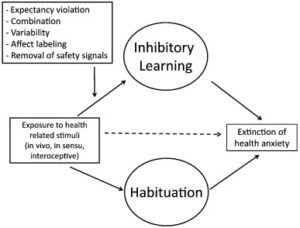If you suffer from OCD, then inhibitory learning may be the answer to your prayers. Inhibitory learning is a method that can help you overcome any unwanted behavior. It works by teaching your brain to ignore the obsessive thoughts and rituals associated with OCD. In this blog post, we will discuss how inhibitory learning works and how it can help you overcome your OCD symptoms!
Contents
- 1 What Is Inhibitory Learning?
- 2 How Does Inhibitory Learning Work For OCD?
- 3 Types Of Inhibitory Learning
- 4 How To Choose The Right Technique?
- 5 How Can A Therapist Help?
- 6 who needs inhibitory learning?
- 7 how does inhibitory learning improve the quality of life?
- 7.1 Inhibitory learning can help us to understand our thoughts and feelings.
- 7.2 help us to develop better problem-solving skills.
- 7.3 Inhibitory learning can help us to learn how to relax and control our anxiety.
- 7.4 It boosts our self-confidence
- 7.5 It helps us to cope with change
- 7.6 It improves bonds in our relationships.
- 7.7 It helps us to be more assertive.
- 8 Conclusion
What Is Inhibitory Learning? 
Inhibitory learning is when we learn to inhibit, or stop, a particular behavior. It’s something that we do naturally all the time, but it can also be helpful to think about inhibitory learning when we’re trying to overcome a bad habit or overcome OCD.
When we inhibit a behavior, we’re essentially telling our brain that we don’t want to do that thing anymore. We’re changing the way our brain responds to a particular stimulus. And, over time, this can help to reduce the overall frequency of the behavior.
How Does Inhibitory Learning Work For OCD?
Inhibitory learning is useful for managing and overcoming OCD in many ways. 
- One way it helps is by allowing you to inhibit or stop certain behaviors that may be harmful to us. For example, if we have a fear of snakes, inhibitory learning can help us to stop ourselves from going near snakes. This is because we have learned that snakes are dangerous and can harm us.
- Inhibitory learning can also help to overcome our fears and phobias. For example, if we are afraid of heights, inhibitory learning can help us to overcome our fear by teaching us to inhibit the behaviors that are associated with heights (such as looking down from a high place).
- Inhibitory learning can also help to control our emotions. For example, if we are angry, inhibitory learning can help us to control our anger by teaching us to inhibit the behaviors that are associated with anger (such as hitting or yelling).
- Inhibitory learning can also help to improve our memory. For example, if we want to remember a list of items, inhibitory learning can help us to remember the items by teaching us to inhibit the behaviors that are associated with forgetting ( such as distractions).
Types Of Inhibitory Learning 
There are four main types of inhibitory learning: classical conditioning, operant conditioning, observational learning, and vicarious learning. Each type of inhibitory learning is unique and has its own set of benefits.
Classical Conditioning
It is a type of inhibitory learning that involves linking an unpleasant stimulus with the desired behavior. This type of inhibitory learning is often used to treat phobias and anxiety disorders.
Classical conditioning is a type of inhibitory learning that helps us to associate certain stimuli with negative outcomes. For example, if we are constantly bombarded with images of dirt and germs, our brain will start to associate these images with negative outcomes (i.e. illness).
As a result, we will start to avoid these stimuli altogether. Classical conditioning will help us to overcome OCD by helping us to associate obsessive thoughts and compulsions with negative outcomes. In other words, we will start to avoid the thoughts and behaviors that trigger our OCD. In addition, classical conditioning will help us to develop new, healthier coping mechanisms for dealing with our OCD. By inhibitory learning, we can start to take control of our OCD and live a more normal life.
Observational Learning
Observational learning is a type of learning that occurs as a consequence of observing the behavior of others. It is a powerful tool that can be used to overcome OCD. When we see someone else performing the desired behavior, we are more likely to imitate that behavior. This is because we learn by observing the consequences of other people’s actions.
If we see somebody else succeeding at the desired behavior, we are more likely to try that behavior ourselves. In contrast, if we see somebody else fail at the desired behavior, we are less likely to try that behavior ourselves. Therefore, observational learning can be used to overcome OCD by observing people who are successful in overcoming their OCD. This will provide a model for us to follow and increase the likelihood that we will be successful in overcoming our OCD.
The process involves four steps:
- The first step is to identify a role model who has successfully overcome OCD. This could be a friend, family member, or even a celebrity. It is important to choose someone who you admire and who you feel you can imitate.
- The second step is to observe the role model’s behavior. This means paying attention to how they think, feel, and behave. It is important to try to understand what makes them successful in overcoming OCD.
- The third step is to imitate the role model’s behavior. This means trying to do what they do and thinking as they think. It is important to remember that you will not be perfect at this and that it is okay to make mistakes.
- The fourth step is to practice the behavior you have learned. This means using what you have learned from your role model to overcome your own OCD. It is important to keep practicing until the desired behavior becomes automatic.
Vicarious Learning
This involves learning from the experiences of others.
This type of learning can be particularly helpful for people who have difficulty understanding their OCD or who have trouble controlling their compulsions. The process involves learning to inhibit the urge to perform a compulsion by observing someone else who is successful in doing so.
The first step is to find someone who has already overcome OCD. This person can be a friend, family member, therapist, or even someone who is featured in a book or film. It is important to find someone who has had success in overcoming OCD so that you can learn from their experience.
The next step is to observe this person. Pay attention to how they handle their OCD symptoms and what techniques they use to control their compulsions. It is important to take note of what works for them so that you can try these techniques yourself.
Once you have observed this person, the next step is to start practicing these techniques yourself. If you find that a particular technique works well for you, then continue to practice it until it becomes second nature. Remember that it takes time and patience to overcome OCD, but inhibitory learning can help you get there.
Social Learning Theory
This is a combination of classical conditioning, operant conditioning, and observational learning. Social learning theory is often used to treat anxiety disorders and depression.
Each type of inhibitory learning has its own set of benefits and drawbacks. It is important to consult with a mental health professional to determine which type of inhibitory learning is right for you.
Each type of inhibitory learning has its unique benefits that can help you overcome OCD. Choose the type of inhibitory learning that best fits your needs and start on the path to recovery today.
Inhibitory learning is a powerful tool that can help you overcome OCD. Choose the type of inhibitory learning that best fits your needs and start on the path to recovery today.
How To Choose The Right Technique? 
There are many inhibitory learning techniques that you can choose from. But it is important to pick the one that is right for you. Here are some things to consider when choosing an inhibitory learning technique:-
- Your goal: What do you want to achieve with inhibitory learning?
- Your resources: What inhibitory learning techniques do you have access to?
- Your comfort level: How comfortable are you with using inhibitory learning techniques?
- Your motivation: How motivated are you to use inhibitory learning techniques?
- Your willingness to change: How willing are you to change your inhibitory learning techniques?-Your ability to commit: How able are you to commit to using inhibitory learning techniques?
If you are not sure which inhibitory learning technique to choose, you can always ask a professional for help. inhibitory learning techniques can be very effective in treating OCD. But it is important to find the right technique for you.
With the right inhibitory learning technique, you can overcome OCD and live a happy and healthy life. inhibitory learning techniques are not a cure for OCD, but they can help you manage your symptoms and live a normal life. inhibitory learning techniques can help you achieve your goals and make positive changes in your life.
How Can A Therapist Help? 
A therapist can help you in inhibitory learning by providing you with tools and resources to manage your OCD. In addition, a therapist can help you to understand your triggers and how to avoid them.
Finally, a therapist can help you to develop a plan for when you are feeling triggered. inhibitory learning for OCD can be a difficult process, but with the help of a therapist, you can overcome your OCD.
For example, your therapist can help you to understand your thoughts and behaviors, and how to change them. In addition, your therapist can provide you with resources and tools to manage your OCD. Finally, your therapist can help you to develop a plan for when you are feeling triggered. If you are not aware of inhibitory learning for OCD, it is important to seek out professional help. A therapist can provide you with the resources and tools you need to manage your OCD and live a healthy life.
who needs inhibitory learning? 
Inhibitory learning is a type of learning that helps us to overcome our fears and phobias. It is especially useful for people who suffer from OCD, as it can help them to control their compulsions and intrusive thoughts.
Inhibitory learning is based on the principle of exposure therapy, which is a type of psychological treatment that involves exposing the patient to their fear in a controlled and safe environment. Through exposure therapy, the patient can learn that their fear is not as dangerous as they thought it was and that they can control their reactions to it.
below are the category of people who actually need inhibitory learning:
- People with OCD who have intrusive thoughts about harm coming to them or their loved ones
- People with OCD who engage in compulsive behaviors such as hand-washing, counting, or checking
- People with specific phobias, such as a fear of flying, heights, or snakes
- People with a social anxiety disorder who have a fear of public speaking or being around people
- People with post-traumatic stress disorder who are triggered by reminders of their trauma
- People with generalized anxiety disorder worry about many different things daily.
how does inhibitory learning improve the quality of life? 
Inhibitory learning is a process that helps us to overcome OCD. This is because inhibitory learning allows us to learn from our mistakes and to inhibit or stop our compulsive behaviors. In other words, inhibitory learning helps us to control our OCD.
There are many benefits of inhibitory learning. For example, inhibitory learning can help us to reduce our anxiety levels, to improve our quality of life, and to increase our self-esteem. Inhibitory learning can also help us to cope with stress and to overcome our fears.
There are many ways in which inhibitory learning can help us to overcome OCD. Inhibitory learning can help us to understand our OCD and to learn how to control our compulsions. Inhibitory learning can also help us to identify our triggers and to develop coping strategies.
Apart from these, there are other benefits such as:
Inhibitory learning can help us to understand our thoughts and feelings.
Inhibitory learning helps us to understand the role of inhibitory processes in our thoughts and feelings. There are various reasons for this. inhibitory learning can help us to understand how we inhibit certain thoughts or feelings. For example, we might inhibit a thought because it is anxiety-provoking. Inhibitory learning can also help us to understand how we inhibit certain behaviors. For example, we might inhibit a behavior because it is socially inappropriate. Inhibitory learning can also help us to understand how we inhibit certain emotions. For example, we might inhibit an emotion because it is overwhelming. Inhibitory learning can also help us to understand how we inhibit certain memories.
help us to develop better problem-solving skills.
Inhibitory learning can help us to develop better problem-solving skills by teaching us how to inhibit certain responses. For example, if we are trying to solve a problem and we keep getting the same answer, inhibitory learning can help us to inhibit that response and try something different. This can be especially helpful in OCD, where we may get stuck in the same loop of behaviors. inhibitory learning can help us to break out of that loop and find new solutions. For example, if we are trying to solve a problem and we keep getting the same answer, inhibitory learning can help us to inhibit that response and try something different. This can be especially helpful in OCD, where we may get stuck in the same loop of behaviors. inhibitory learning can help us to break out of that loop and find new solutions.
Inhibitory learning can help us to learn how to relax and control our anxiety.
Inhibitory learning is a process whereby we learn to inhibit, or stop, certain responses. It’s what allows us to control our impulses and anxiety, and it’s something that we can learn to do better.
For example, imagine you’re at a party and you see someone you’re attracted to across the room. In the past, you might have gone over and tried to talk to them, even if you were feeling shy or anxious. But now, thanks to inhibitory learning, you know that it’s okay to wait and see if they come over to you instead. This can be a difficult process to learn, but it’s worth it in the long run. As a result, you’ll be able to control your OCD and anxiety in a much better way. inhibitory learning can help us to relax and control our anxiety by teaching us how to inhibit our impulses.
It boosts our self-confidence
Inhibitory learning can help us to overcome OCD by boosting our self-confidence. When we have OCD, we tend to doubt ourselves a lot and second-guess our decisions. This can lead to us feeling very unsure of ourselves and our ability to cope with the disorder. However, inhibitory learning can help us to boost our self-confidence by teaching us to trust our judgment and instincts. For example, if we have a fear of germs, inhibitory learning can help us to learn that not all germs are harmful and that we can trust our own ability to judge when it is safe to touch something. This can help us to feel more confident in our ability to cope with our OCD and ultimately help us to overcome the disorder.
It helps us to cope with change
Inhibitory learning plays an important role in helping us cope with change. When we are presented with a new situation, our brain automatically begins to inhibit or suppress our previous response to the situation. This allows us to adapt our behavior to the new situation.
For example, imagine that you are a child who is afraid of dogs. Every time you see a dog, your brain will inhibit your previous response of fear and instead replace it with a new response of caution. Over time, as you continue to inhibit your fear response and replace it with a more appropriate response, you will gradually overcome your fear of dogs.
Similarly, inhibitory learning can help us to overcome our fears and compulsions in OCD. By inhibitory learning, we can learn to inhibit our previous response of fear or anxiety and instead replace it with a more appropriate response.
It improves bonds in our relationships.
Inhibitory learning can help us overcome OCD by helping us to inhibit our compulsions. This type of learning helps us to learn to inhibit our compulsions by helping us to bond with others. Inhibitory learning can help us to improve our relationships by helping us to inhibit our compulsions. This type of learning can help us to improve our relationships by helping us to bond with others. For example, if we have a friend who is always asking us to do things that we don’t want to do, inhibitory learning can help us to learn to inhibit our friend’s requests.
It helps us to be more assertive.
Inhibitory learning helps us to be more assertive by teaching us to inhibit, or stop, our automatic responses to things that trigger our OCD. There are various theories for this. One theory is that it helps us to see our triggers as less dangerous or threatening. Another theory is that inhibitory learning helps us to better control our impulses. Either way, inhibitory learning is a powerful tool that can help us to overcome our OCD. Let’s take an example.
Imagine that you are walking down the street and you see a dog. You have a fear of dogs, so your first instinct is to run away. However, you know that if you run away, the dog will chase you. So instead, you use inhibitory learning to inhibit your automatic response of running away. You force yourself to stand still and the dog eventually loses interest and walks away.
In this example, inhibitory learning helped you to be more assertive by teaching you to inhibit your automatic response of running away. It is a powerful tool that can help us to overcome our OCD.
Conclusion
At the end of this blog, it is concluded that inhibitory learning can help you overcome OCD. inhibitory learning is a process of learning that helps you to control your impulses and manage difficult situations. It is a powerful tool that can be used to manage OCD symptoms and lead a more fulfilling life. inhibitory learning can help you overcome OCD by changing the way you think and behave. It can help you to control your impulses, manage difficult situations and lead a more fulfilling life. inhibitory learning is a powerful tool that can be used to manage OCD symptoms and lead a more fulfilling life. Apart from OCD, it is a great miracle that can help you in different aspects of life. inhibitory learning can help us to achieve our goals and to be successful in life.
Professional Guidance is the first step to moving toward your healing journey. You can try reaching Therapy Mantra to seek expert help in the comfort of your own home. Our therapists will help you get a solution to manage and overcome your problem. You can book your online therapy and talk directly to your assigned mentor. You may also download our free OCD treatment app on Android or iOS app.








